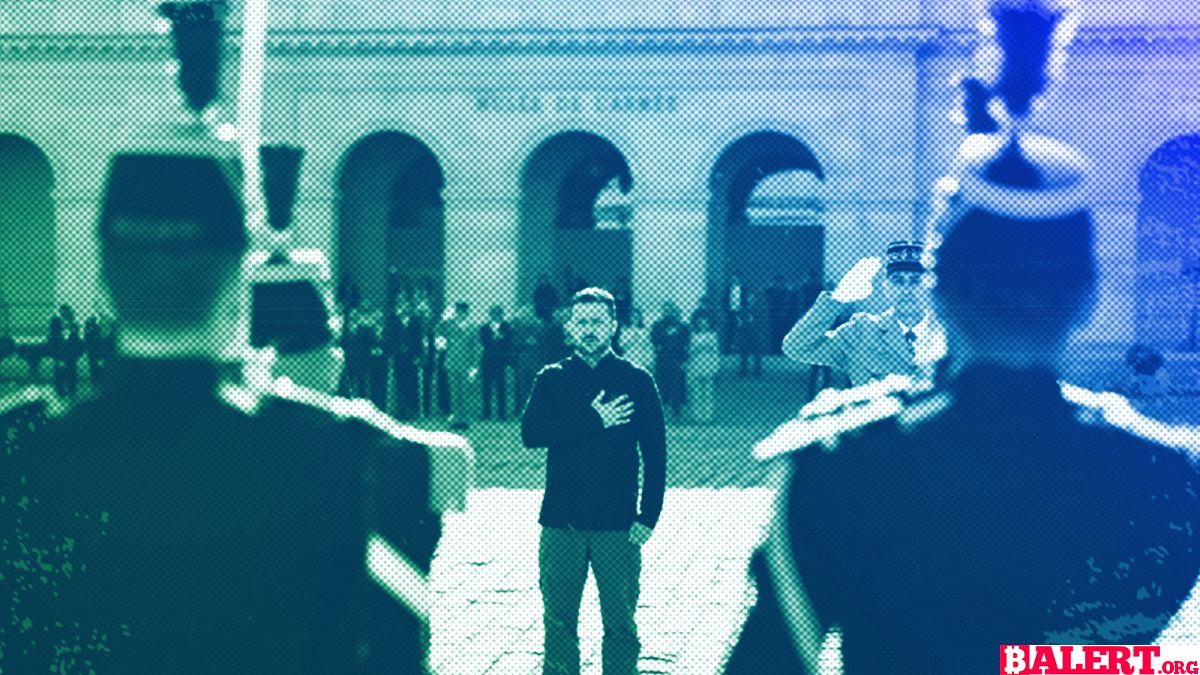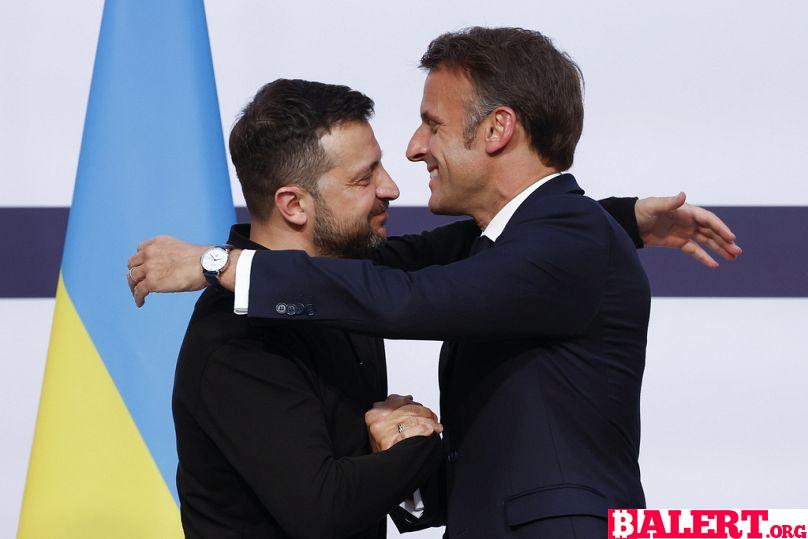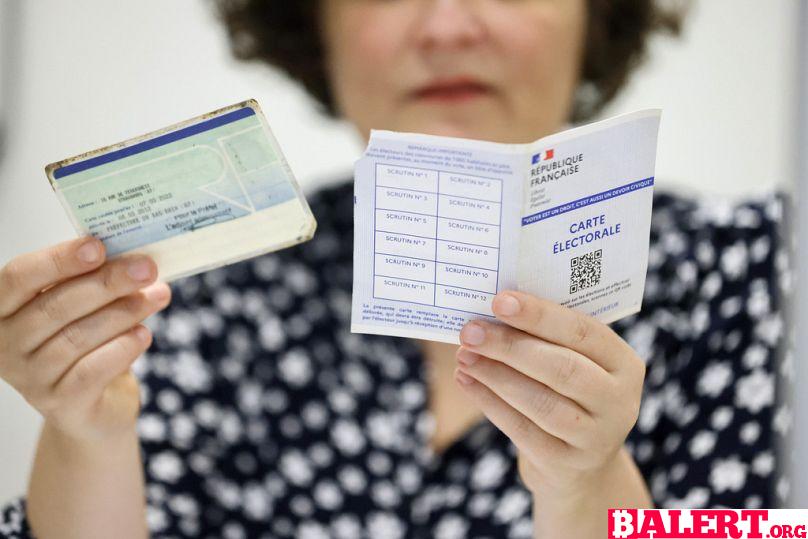World
Divisions Among French Citizens on Foreign Policy Regarding Ukraine
Explore the divisions among French citizens regarding foreign policy on Ukraine. This analysis delves into varying opinions, political implications, and the impact of public sentiment on France’s stance in the ongoing conflict.

Divisions Among French Citizens on Foreign Policy

French citizens are not just divided on domestic issues; they also have differing opinions on foreign policy. If President Emmanuel Macron and a National Rally-led government coexist, there is a significant risk that the situation in Ukraine will become a contentious political issue. This potential conflict arises not from a lack of national consensus on supporting Ukraine — there is strong agreement — but from differing opinions on the future course of action regarding the war. If these differences become politicized, they could undermine the current unity around supporting Kyiv. Internal disputes over Ukraine policy could have detrimental effects on EU cohesion, Ukraine’s prospects, and, ultimately, the security of both France and Europe.
End Game Divides the French
Over the last two years, the French public has largely shared the same “élan du coeur” as many other Europeans, supporting Macron’s shift towards backing Ukraine following his earlier attempts to balance relations between Ukraine and Russia in early 2022. The consensus around supporting Ukraine and supplying it with weapons has grown so strong that all three major parties in the upcoming French elections are in agreement. The New Popular Front, representing the left, has taken a firm stance on this issue, particularly concerning the provision of essential military equipment. Meanwhile, Jordan Bardella of the National Rally has asserted that France must continue to provide Ukraine “the means to defend itself.”
However, when it comes to the end game, the French populace is sharply divided. In a recent multi-country poll, responses were almost evenly split into three categories regarding Europe’s future actions concerning the war in Ukraine. Approximately 30% of respondents expressed a desire for Europe to support Ukraine in reclaiming territories currently occupied by Russia. In contrast, around 36% preferred that Europe encourage Ukraine to negotiate a peace settlement. The remaining 34% were either unsure, indifferent, or did not align with either viewpoint. The sentiment among Ukrainians is clear: they wish to continue fighting, believing they can achieve victory with sufficient military aid from their allies.
French President Emmanuel Macron, right, embraces Ukrainian President Volodymyr Zelenskyy during a joint press conference at the Elysee Palace in Paris on June 7, 2024. This division among French citizens appears to be solidifying, as it was already evident in our January poll.
Macron has attempted to shift public opinion. In February, he suggested that European nations might eventually need to deploy ground troops. He reiterated this point in a subsequent television interview, emphasizing the threats posed by Russia. However, his somber assessment has not succeeded in galvanizing the French public around the idea that Europe should actively support Ukraine in reclaiming its territory — in fact, the proportion of people holding this view has decreased from 35% to 30% over the past five months. At the same time, the percentage of the French public who perceive their country as being at war with Russia has risen from 24% to 32% over the last nine months, making France one of the European countries with the highest levels of such perception. Still, Macron has managed to familiarize the public with alternative forms of military support: 54% of French citizens now express openness to deploying French troops for technical, non-combat assistance to the Ukrainian Armed Forces.
Bickering Allies Won’t Help Ukraine
Throughout Europe, there is a notable split regarding whether to support Ukraine in military conflict or encourage it to negotiate. Ukrainians remain resolute: they are committed to fighting, convinced that victory is within reach, contingent on receiving adequate armaments from their allies.
If the National Rally gains power on July 7, whether independently or in coalition, there may be a gradual shift towards framing French support for Ukraine as “Macron’s war.” If no party succeeds in forming a majority government and the 2027 presidential election approaches, there exists a genuine risk that France’s commitment to Ukraine could become collateral damage. Ukraine cannot afford allies mired in internal disputes; it has already suffered due to the delays such disagreements create. Regardless of the outcome of the legislative elections, it is essential that French backing for Ukraine remains unwavering. As political leaders campaign for public support, it is imperative that they do not succumb to the temptation of using foreign policy issues to deflect criticism, especially if France enters a period of prolonged political instability. Such a move would be a grave error. Ukraine requires steadfast allies, not factions embroiled in petty squabbles.

Currently, there is a shared sentiment across the political spectrum in France regarding the division among voters on whether Europe should support Ukraine in combat or urge it toward negotiations. There is no significant partisan divide on this issue — and there ought not to be.
Who Will Open the Champagne?
In the near future, the upcoming presidential election in the United States will serve as a litmus test for European support for Ukraine. Should a Bardella-led government take shape in Paris alongside a potential Trump victory in America, a shift in the Western approach to Ukraine and Russia seems inevitable. France may not stand alone in altering its stance, as countries like Italy, Greece, Austria, or Hungary exhibit similar public skepticism regarding the depth of European support for Ukraine. However, France’s unequivocal backing for Ukraine — both militarily and politically — has made a discernible impact, fostering unity and encouraging other European nations to maintain solidarity with Kyiv.
If Paris can no longer fulfill this leadership role, other capitals may attempt to fill the void, but such efforts could prove too little, too late. A decline in French support could very well become the turning point that undermines the European consensus against Russian aggression. Should that happen, one can only imagine who will be celebrating such a development.
Celia Belin and Pawel Zerka are Senior Fellows at the European Council on Foreign Relations (ECFR).
At Euronews, we believe all views matter. Contact us at view@euronews.com to share your pitches or submissions and participate in the ongoing conversation.
World
Dominique Pelicot Testifies in Harrowing Rape Trial
Join us as Dominique Pelicot courageously testifies in a harrowing rape trial, shedding light on the complexities of trauma and justice. Her powerful story raises crucial questions about the legal system and the importance of support for survivors.

Dominique Pelicot Takes the Stand in Shocking Rape Trial
In a courtroom drama that has captivated France and garnered international attention, Dominique Pelicot, the man at the center of a harrowing rape trial, finally addressed the court. With tears streaming down his face, he recounted how his wife had been instrumental in helping him cope with a tumultuous past marked by trauma. He revealed that he had endured a sexual assault at the tender age of nine while hospitalized, and he also witnessed a gang rape during his teenage years while working as an apprentice electrician on a construction site.
“She didn’t deserve this, I acknowledge that,” Mr. Pelicot stated, his voice barely audible as he struggled to convey his emotions. The gravity of the situation weighed heavily on him, and the courtroom fell silent, straining to catch his every word.
Now 71 years old, Mr. Pelicot faces serious allegations of drugging his wife, Gisèle Pelicot, whom he has been married to for half a century, over a span of nearly ten years. Prosecutors contend that he used drugs to render her comatose, allowing him to rape her repeatedly. Furthermore, authorities allege that he went so far as to invite numerous men into their home, facilitating a nightmarish scenario where they, too, engaged in the assault of his wife.
Overall, 51 men, including Mr. Pelicot, are on trial concurrently, primarily facing charges related to the aggravated rape of Ms. Pelicot. Among them, one individual has already pleaded guilty to similar crimes, admitting to drugging his own wife to assault her and inviting Mr. Pelicot to partake in the horrific act while she was incapacitated.
Mr. Pelicot’s unexpected testimony came after a tumultuous start to the trial. Just a week in, he was stricken with severe health issues that forced him to miss four consecutive days in court. The head judge ultimately decided to postpone proceedings, as Mr. Pelicot was diagnosed with kidney stones, a kidney infection, and prostate complications, adding yet another layer of complexity to this already harrowing case.
World
Meta Bans Russian State Media Outlets from Social Media Platforms
Explore the implications of Meta’s decision to ban Russian state media outlets from its social media platforms. Understand the impact on information dissemination and the ongoing battle against misinformation in the digital landscape.

Meta Imposes Global Ban on Russian State Media Outlets
In a significant move, Meta Platforms, Inc., the parent company of Facebook, has announced the prohibition of Russian state media outlets, including RT (Russia Today) and Rossiya Segodnya, from all its social media platforms. The decision stems from the company’s concerns regarding the deceptive strategies employed by these media organizations to execute covert influence operations across the internet.
Meta made this announcement on Monday, emphasizing that the ban will be enforced worldwide across its various platforms, such as Instagram, WhatsApp, and Threads. The rollout of this ban is expected to take place over the coming days.
Statement from Meta
A spokesperson for Meta elaborated on the decision, stating, “After careful consideration, we have expanded our ongoing enforcement actions against Russian state media outlets. As a result, Rossiya Segodnya, RT, and other affiliated entities are now banned from our applications globally due to their involvement in foreign interference activities.”
For further insights into this development, watch the video in the player above.
World
Trump Recalls Alleged Assassination Attempt While Golfing
Explore Donald Trump’s chilling recollection of an alleged assassination attempt he experienced while enjoying a round of golf. Delve into the tense moments and his reflections on safety, fame, and the unpredictability of public life.

In a recent interview on the social media platform X, Republican presidential nominee Donald Trump recounted a harrowing incident he claims to have experienced while playing golf. Trump described how, during a peaceful Sunday morning round with friends, the tranquility of the day was abruptly shattered by the sound of gunfire in the air.
“It was a beautiful day, everything was just perfect,” Trump reflected. “Then all of a sudden, we heard shots being fired—probably around four or five in total.” He went on to explain that a Secret Service agent was the first to spot the suspect, who was allegedly armed with an AK-47, a powerful assault rifle.
“The agent saw the barrel of the weapon and immediately took action, returning fire at the barrel and aiming in the direction of the bushes,” Trump detailed. “I would have loved to have sunk that last putt, but we decided it was best to leave the scene promptly.”
Trump expressed his gratitude towards the agents and a vigilant civilian who aided in tracking down the suspect, who was eventually apprehended following a high-speed chase.
Suspect Faces Multiple Federal Gun Charges
The FBI has identified the suspect as Ryan Wesley Routh, accusing him of targeting Trump during his time at the golf club in West Palm Beach, Florida. According to an FBI report, Routh had allegedly hidden among the hedges of the golf course for an astonishing 12 hours. Authorities discovered an SKS-style assault rifle, a GoPro camera, and a bag of food at the scene.
The 58-year-old Routh is now facing two serious federal gun charges. If convicted on both counts, he could face a combined maximum sentence of 20 years in prison. Notably, neither of the charges is directly related to an assassination attempt. The first charge pertains to possessing a firearm despite a prior felony conviction, which carries a potential 15-year sentence, a fine of $250,000 (€225,000), and three years of supervised release.
The second charge involves possession of a firearm with an obliterated serial number, which could result in a five-year prison term, the same financial penalties, and also three years of supervised release. As the investigation continues, additional charges could be forthcoming.
While the motive behind Routh’s actions remains unclear, his digital footprint reveals strong political affiliations, particularly concerning issues surrounding Ukraine and China. Routh consistently expressed support for Ukraine across various social media platforms, even claiming to have orchestrated a recruitment scheme for international volunteers aiming to assist Ukraine in its fight against Russia’s invasion. This behavior has been denounced by Ukrainian soldiers and members of the International Legion, who disavowed Routh’s actions and motives.
-

 Business7 months ago
Business7 months agoThe Significance of Jackson Hole: A Central Banking Tradition
-

 Tech6 months ago
Tech6 months agoNew Leaks and Features About the Samsung Galaxy S25 Ultra
-

 Article9 months ago
Article9 months agoCreative Design Applications Developed with Artificial Intelligence
-

 Business6 months ago
Business6 months agoBhutan’s Strategic Investment in Bitcoin: A New Era for the Himalayan Kingdom
-

 Business8 months ago
Business8 months agoObituary: Dan Collins
-

 World6 months ago
World6 months agoThierry Breton Resigns: Impact on European Union Leadership
-

 Gaming6 months ago
Gaming6 months agoNew Details and Trailer Released for Dead Rising Deluxe Remaster
-

 Gaming6 months ago
Gaming6 months agoNew Details for Alan Wake 2 and PlayStation 5 Pro Announcement












